A Year of Roundtables: Helping Diverse Cultures Succeed in the Future Tech Force
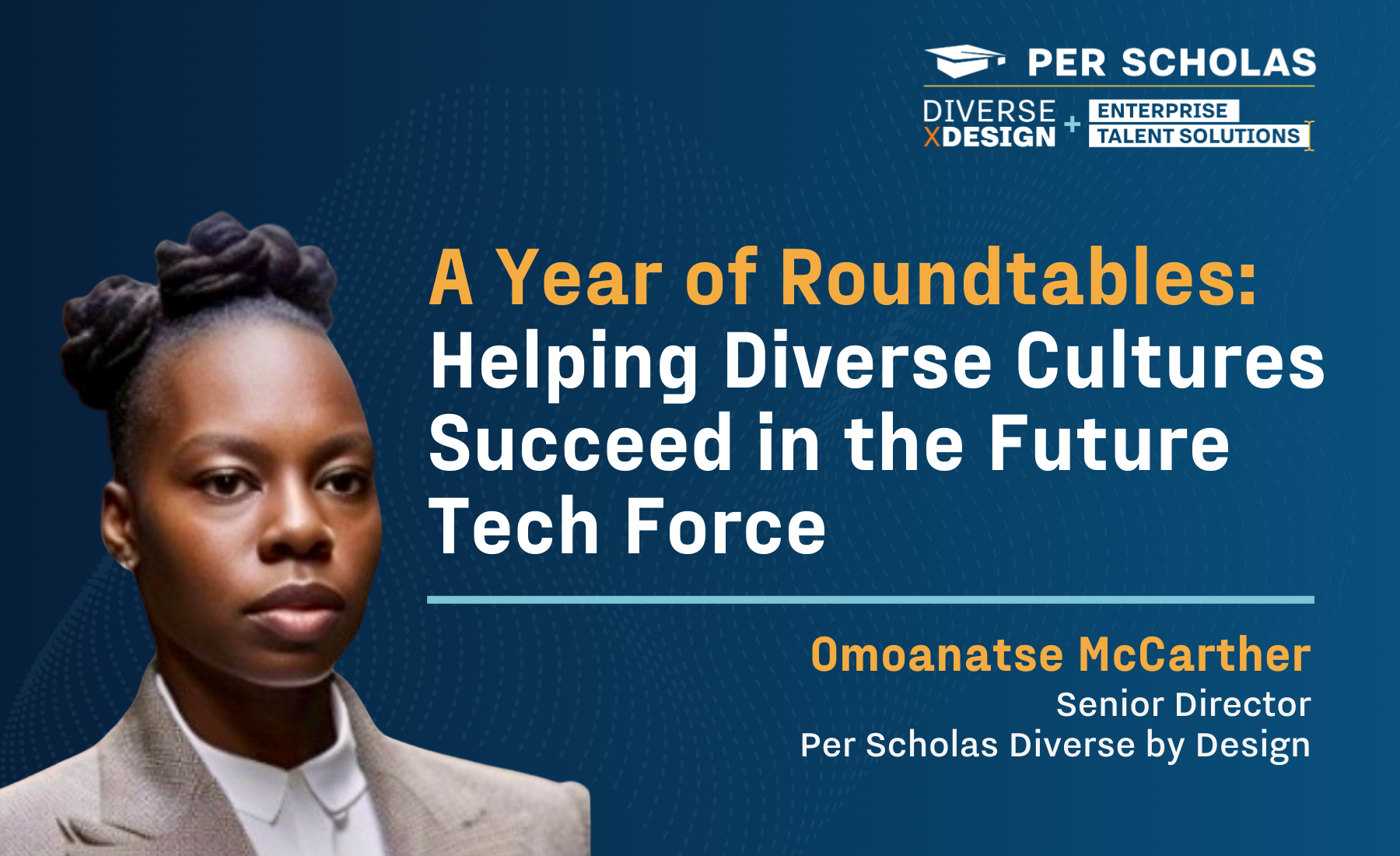
A Year of Roundtables: Helping Diverse Cultures Succeed in the Future Tech Force
Written by Omoanatse McCarther
In the dynamic landscape of technology, integrating DEI (Diversity, Equity, and Inclusion) initiatives have emerged as a pivotal factor for fostering innovation and advancement. Throughout 2023, Diverse by Design hosted a series of thought-provoking roundtable discussions as part of our “Futures Month” initiatives. These sessions were meticulously designed to dissect success narratives and furnish pragmatic insights tailored for technology leaders. The overarching objective was to empower leaders to seamlessly embed diverse cohorts into their DEI frameworks, thereby fostering a more inclusive trajectory for the future.
These virtual roundtables transcended mere anecdotal accounts, offering actionable guidance. Each session distilled pivotal takeaways, practical strategies, and implementable tips. The intention was to create a roadmap, deciphering invaluable insights that can equip technology leaders to cultivate teams that are more diverse, inclusive, and primed to tackle tomorrow’s challenges.
Black Futures Month Roundtable
Our inaugural roundtable featured esteemed panelists, including Athenia Figgs from EY, Damien Howard from Per Scholas, and Oche Idoko from Barclays. The focus of this dialogue centered on the imperative of cultivating mentorship programs for Black technologists. Emphasizing the reciprocal benefits inherent in participating as both mentors and mentees, the discussion underscored how such engagements foster meaningful connections and facilitate pivotal opportunities crucial for career advancement. Access to these programs was underscored as a transformative gateway for Black individuals navigating the tech landscape. All while acknowledging and celebrating Black Futures Month, highlighting the extraordinary achievements of black technologists.
Women’s Futures Month Roundtable
We celebrated the contributions of women in tech during our Women’s Futures Month roundtable, highlighting Dr. Marian Croak’s groundbreaking work while echoing the revelation that only 15% of engineering jobs are held by women, underscoring the imperative for change. In our Women’s Futures Month Roundtable, we celebrated the achievements of women in the tech industry while casting a forward-looking gaze. Despite women comprising a mere 19% of the tech workforce, the conversation pivoted towards fostering greater opportunities not only for women but also for other underrepresented demographics in the tech domain. Central to the discourse was the imperative of dismantling barriers obstructing women’s progression into tech roles and leadership positions. The emphasis was not solely on recognizing challenges but on catalyzing actionable measures to engender a more open and inclusive tech ecosystem conducive to the flourishing of women professionals. A notable highlight was the commendable increase in women technologists from 33% to 41% in 2022, signaling promising strides forward.
Pride Futures Month Roundtable
During our Pride Month roundtable, the spotlight illuminated avenues for enhancing opportunities for diverse technologists through collaborative efforts with employers and the establishment of supportive environments tailored for underrepresented groups. The dialogue shed light on strategies employed by Per Scholas and other entities to address the underrepresentation of LGBTQ+ individuals in recent diversity initiatives within the tech sector. Key considerations encompassed the use of inclusive language, avoidance of assumptions pertaining to gender identity or sexual orientation, and the provision of dedicated resources for employee groups. These initiatives are geared towards fostering connectivity and advocating for diversity while urging companies to champion LGBTQ+ inclusion in the tech workforce actively.
Hispanic Futures Month Roundtable
We concluded our series for 2023 with a celebration of Hispanic and Latinx voices in the tech community. The remarkable contributions of leaders like Elizabeth Agosto, Laura Gomez, and Karla Monterroso underscored the pivotal role Hispanics play in building the global tech landscape. With Hispanics constituting only approximately 8% of the tech workforce (as per a Pew Research Center report), our speakers imparted invaluable insights on empowering and uplifting Hispanics in the tech realm. The discussion underscored the significance of bilingual resources wherever feasible and underscored the imperative of acknowledging alternative educational pathways, recognizing that not all individuals have equitable access to traditional four-year college education. These insights underscored a commitment to fostering an inclusive and supportive environment for Hispanics, ensuring equitable opportunities for success irrespective of background.
Looking Ahead in 2024
The preceding year’s roundtables served as a poignant reminder of the transformative potential of diversity within the tech industry. They underscored the necessity of embracing diverse perspectives and backgrounds as catalysts for innovation and progress. Let us not overlook the fact that diversity is not merely a moral imperative but also a potent driver of business success.
As we express gratitude for your unwavering support throughout 2023, we extend an invitation to join us in shaping a more diverse and inclusive future in technology. Let’s carry the momentum of this year into the next, united in our commitment to fostering change. Join us on February 29 for “Diverse by Design Presents Securing the Future: Embracing Diversity in Cybersecurity,” where we will delve into how diversity in action yields tangible outcomes, particularly within the cybersecurity domain. Register now to be part of this transformative dialogue.
How Shaking Up the Student Loan System Could Benefit Workers and Business Leaders
A recent Forbes article written by Per Scholas’ funding partner Stand Together discusses the challenge of finding qualified job applicants. Stand Together suggests innovative financing models can bridge the gap between workforce needs and individual aspirations. These models tie tuition to employment outcomes, incentivizing education providers to deliver relevant skills and students to invest time in programs that lead to high earning potential. Per Scholas is specifically highlighted as a successful example of an innovative financing model offering free IT training and career support, helping individuals achieve career goals debt-free.
Read about the innovative education finance models here!
The Allstate Foundation Bolsters Future Technologists with Hands-On Partnership
The Allstate Foundation, a Founder’s Circle partner of Per Scholas, has funded our tuition-free tech training programs since 2021. The Foundation proudly supports Per Scholas through its racial equity pillar and enables Per Scholas to provide rigorous IT job training and connections to employment opportunities for diverse adult learners from low-to-moderate income households across our growing 20+ training campuses.
The Allstate Foundation has taken a hands-on approach as a partner, connecting with Per Scholas learners and alumni as they become technologists. Most recently, Allstate executives in Chicago visited our Per Scholas Chicago campus to share their time, insights, and expertise with our alumni. The discussions were enlightening, and our alumni walked away with advice and inspiration for their career journeys. This interaction fostered meaningful connections between our alumni and industry leaders with invaluable industry knowledge.
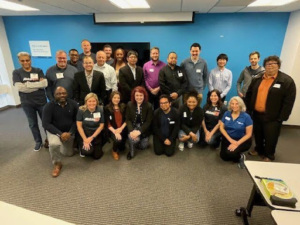
Per Scholas Director of Development, Tia Abner, is currently participating in The Allstate Foundation Executive Leadership Program. “Embarking on The Allstate Foundation Executive Leadership Program has been a profound honor,” Tia reflected. “As a member of the Class of 2024, the joy of learning is boundless, and the collective wisdom shared is inspiring. I am delighted to join this dynamic community of nonprofit leaders, united in our commitment to growth, innovation, and making a lasting impact.”
The Allstate Foundation’s commitment to closing the racial opportunity gap has helped promote economic progress for thousands of technologists of color and supports historically underrepresented communities to secure thriving careers in partnership with Per Scholas.
Per Scholas President and CEO Plinio Ayala Contributes a Chapter to Next Generation Evidence: Strategies for More Equitable Social Impact
Per Scholas President and CEO Plinio Ayala recently contributed a chapter to Next Generation Evidence: Strategies for More Equitable Social Impact. In it, he recalls Per Scholas’ overnight transition to remote courses as a result of COVID-19. For the two decades prior, Per Scholas conducted our teaching in person to mimic the workplace, which we believed contributed to our success. To keep our training going, we took this as an opportunity to see how our program and learners fared remotely. We began collecting remote participants’ feedback from both the learners and staff. This feedback allowed us to make changes in real-time; we saw what we did right and learned what to improve on. When Barrow Street Consulting conducted an analysis over the summer of 2020, the learner Net Promoter Score was a success – scoring a 67 out of a 100 (the range is -100 to 100, with a typical score in the for-profit sector ranges between a 30 and 40). The feedback from this made us realize that in-person is not the only way for us to successfully provide teaching, and we now continue to offer remote options.
Read the rest of Plinio’s reflection on this experience here.
Empowering Veteran Career Pathways: Tech Training for a Bright Future
With support from the PwC Charitable Foundation, Per Scholas is excited to be launching a new initiative, Per Scholas Vets in Tech: Unlocking Potential for the Military Community. The initiative will target and engage the Military Community to generate a robust pipeline of learners affiliated with the U.S. Armed Forces. Through the Per Scholas Vets in Tech initiative, Per Scholas will enroll 900 transitioning Military Veterans and Military Spouses over the next three years, with an emphasis on recruiting female and minority learners. As with all our learners, these Military Community learners will receive the technical training, support, and career guidance needed to help enable them to launch successful careers in tech.
A Closer Look at the Per Scholas Vets in Tech Initiative
Learners enter our courses from an array of backgrounds, seeking the skills and certifications necessary to launch careers in tech, and a consistent portion of our learners are Military Veterans and Spouses looking to start careers in IT as they transition to civilian life. Individuals enrolled in our courses will obtain immersive, cohort-based, and tuition-free training courses conducted full-time over 12-15 weeks in various disciplines, including AWS, Cybersecurity, IT Support, Software Engineering.
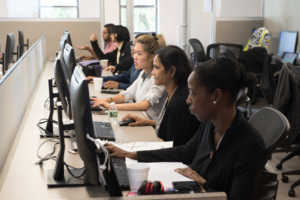 These training courses lead directly to industry-recognized credentials and equip learners with in-demand technical and professional skills that prepare them for success in technology careers, with in-house support to connect directly to employment opportunities post-graduation. Veteran alumni will also have access to no-cost alumni upskilling opportunities to foster wage/career advancement for 2+ years post-graduation.
These training courses lead directly to industry-recognized credentials and equip learners with in-demand technical and professional skills that prepare them for success in technology careers, with in-house support to connect directly to employment opportunities post-graduation. Veteran alumni will also have access to no-cost alumni upskilling opportunities to foster wage/career advancement for 2+ years post-graduation.
In addition to technical training, Per Scholas Vets in Tech initiative contains several components:
- Technical and Professional Development Training: Per Scholas training is 80% technical training focused on in-demand tech skills. The training is also hands-on so alumni are ready to dive into their careers with experience. Additionally, 20% of the training focuses on professional development. Our Learner Support Team and Financial Coaches provide individualized resources and services that support the unique barriers that veterans and their families face as well as ongoing peer support with other veterans to encourage retention. This aspect ensures alumni have the soft skills needed to succeed in the workforce.
- Access to our Employer Network: Per Scholas partners with 850+ employers to connect our learners and alumni with leading businesses. Our business solutions teams partner closely with each Veteran alumni to prepare them for interviews with our employer networking and beyond to land jobs to jumpstart their high-demand careers.
- Strategic Partnerships: Per Scholas is cultivating partnerships with US Armed Forces Support Organizations, military bases, and veteran-friendly employers to recruit eligible veterans, provide supportive resources, and provide direct connections for employment.
 Our outreach is national for this initiative so we can include all of our Military Community, however there is a focus at nine of our campuses, selected based on factors such as local numbers of veterans in the workforce, staff capacity, and more. These nine markets include: Atlanta, Baltimore, Chicago, Cincinnati, North Carolina, Pittsburgh, Phoenix, Philadelphia, and St. Louis, and those in the Military Community are encouraged to apply to any of our campuses local to them.
Our outreach is national for this initiative so we can include all of our Military Community, however there is a focus at nine of our campuses, selected based on factors such as local numbers of veterans in the workforce, staff capacity, and more. These nine markets include: Atlanta, Baltimore, Chicago, Cincinnati, North Carolina, Pittsburgh, Phoenix, Philadelphia, and St. Louis, and those in the Military Community are encouraged to apply to any of our campuses local to them.
Why the Per Scholas Vets in Tech Initiative is Important
- Approximately 200,000 men and women leave U.S. military service each year and return to civilian life. These individuals can face significant challenges during this transitional period, particularly in terms of finding employment.
- More than 174,000 additional jobs will be available in technology in 2023. While there may be tech layoffs throughout the world, there are still hundreds of thousands of tech positions in all industries – not just with technology companies.
- Per Scholas is passionate about the Veteran and Military Spouse community and connecting them with leading businesses with high-growth tech careers. We are excited to work with Veterans and their families to help them unlock their potential.
Additionally, Veterans may struggle to translate skills earned through service into employment opportunities at civilian companies and face physical and mental health barriers to mobility:
- 20% of post-9/11 veterans have no college degree
- 6.6% of working veterans with a high school-or-lower education level are living in poverty
- 43% of post-9/11 veterans are people of color, and 18% are women, both of whom face poorer economic outcomes than white, male veterans
We look at these statistics and know that Per Scholas can support the Veteran and Military Spouse community that face barriers to career mobility with our training.
Meet Some of Our Veteran Alumni
Through Per Scholas Vet in Tech training, a number of Military Community members have been able to launch new, thriving careers in tech after completing their military service. Let’s meet some of our veteran alumni!
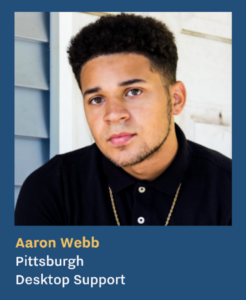
Aaron Webb was an HR Specialist in the Military before applying to Per Scholas. He tried to go to college through his G.I. Bill, but realized that that route was not beneficial to him or his learning style. Aaron joined Per Scholas Pittsburgh’s Desktop Support course and appreciated how Per Scholas’ boot camp-style training was similar to his military boot camp, in which he learned a lot in a short period of time. Aaron felt very supported by his instructors and classmates throughout the course. He graduated with his CompTIA A+ certification and is now pursuing his CCNA certification. Aaron is excited for his future career trajectory and aims to become a full network engineer and explore cloud computing, both of which he is learning more about through his IT Implementation Senior Analyst position at Tenaris. Read more about Aaron here!
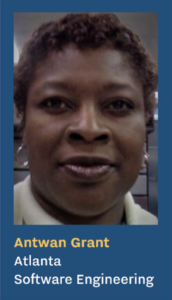
Antwan Grant served in the U.S. Marine Corps after graduating from high school, then took a coding class, which fueled her interest in IT. Pursuing this, Antwan came across Per Scholas Atlanta, and was accepted into the Software Engineering program. Antwan found the coursework difficult and daunting, but she was motivated to continue by her instructors and her family who rooted for her throughout the process. Antwan now works as a Java Automation Test Engineer at Interapt, and helps give back to her Veteran community by serving as a member of American Legion. Learn more about Antwan’s story here
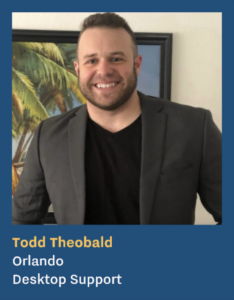 Todd Theobald was unsure what career path he wanted to follow after serving in the U.S. Marine Corps. While in the Marines, he had worked a great deal with computers, and recognized in himself a real interest in and affinity for IT, but, without any technical certifications, Todd struggled to land a job in the field. He joined Per Scholas Orlando’s Desktop Support course and enjoyed his time in the program, appreciating its structured approach to the material, including well-defined goals, schedules, and syllabuses. After graduating with his CompTIA A+ certification, Todd landed a Tier 1 Service Desk Analyst job at Advent Health. He enjoys his job and is excited to learn as much as possible and grow his career. Read more about Todd’s journey as a technologist here!
Todd Theobald was unsure what career path he wanted to follow after serving in the U.S. Marine Corps. While in the Marines, he had worked a great deal with computers, and recognized in himself a real interest in and affinity for IT, but, without any technical certifications, Todd struggled to land a job in the field. He joined Per Scholas Orlando’s Desktop Support course and enjoyed his time in the program, appreciating its structured approach to the material, including well-defined goals, schedules, and syllabuses. After graduating with his CompTIA A+ certification, Todd landed a Tier 1 Service Desk Analyst job at Advent Health. He enjoys his job and is excited to learn as much as possible and grow his career. Read more about Todd’s journey as a technologist here!
How to Apply
We are excited for the launch of Per Scholas Vets in Tech: Unlocking Potential for the Military Community, which will help equip a significant number of Military Veterans and Military Spouses with the skills and training necessary to land high-growth, well-paying jobs in tech over the next few years.
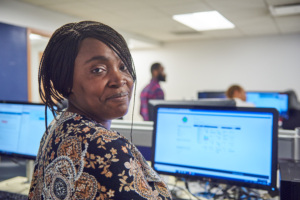 Tech is an excellent field for those looking to transition to civilian life due to its flexibility, variability, and the high demand for technical workers. Furthermore, many of the skills learned and utilized in military service are highly applicable to work in many technical jobs. On average, 80% of our veteran graduates obtain jobs within one year of graduation, earning on average at least 3x of their pre-training wage.
Tech is an excellent field for those looking to transition to civilian life due to its flexibility, variability, and the high demand for technical workers. Furthermore, many of the skills learned and utilized in military service are highly applicable to work in many technical jobs. On average, 80% of our veteran graduates obtain jobs within one year of graduation, earning on average at least 3x of their pre-training wage.
For those in the Military Community interested in applying, please visit our Veterans initiative landing page here.
Per Scholas President and CEO Plinio Ayala Speaks at Salesforce World Tour NYC
On December 14th, Per Scholas partner Salesforce held the New York City stop of their World Tour event. This traveling event brings together Salesforce users, partners, customers, and surrounding communities for a day of learning and discussion, and this year’s event delved into the latests in AI solutions, and its ability to drive productivity and customer satisfaction. Experts from a variety of fields weighed in on the next “Big AIdeas for Good.”
Per Scholas President and CEO, Plinio Ayala was interviewed at the event, and described how Per Scholas has partnered with Salesforce to create Per Scholas Resume Boost, powered by @Salesforce AI. This tool generates a customized resume draft based on a learner’s information and course grade, which is refined with the help of Per Scholas career coaches, expediting the resume-creation process from around 6 hours to just 30 minutes. Beyond technical training a portion of all Per Scholas courses are dedicated to professional development, and this powerful AI tool will greatly support Per Scholas staff, allowing them to devote time to other areas and provide training to a greater number learners. This advancement will help move our organization towards our goal of graduating 10,000 learners per year.
Click to learn more about the event and watch Plinio speak!
How to Build Sustainable, Diverse Tech Talent Pipelines with TEKsystems in CIO Dive
A recent CIO Dive article highlights Per Scholas and TEKsystems’ years-long partnership as the answer to businesses’ IT talent needs. By turning to nontraditional talent pipelines powered by public-private partnerships, businesses can find diverse talent on the cutting edge that will both shape long-term business growth and diversity in the tech industry. Already through this partnership, 1,000+ Per Scholas graduates have been placed in full-time positions with TEKsystems clients.
Read more about our partnership with TEKsystems and how we are building a diverse tech talent pipeline together here.
Per Scholas President and CEO Plinio Ayala Featured in New York Times with OneTen
Per Scholas CEO Plinio Ayala was recently featured in the New York Times article profiling OneTen’s equity-for-all diversity initiatives. Plinio shared his agreement for eliminating degree-based job requirements and how skills-based hiring and promotion can benefit all workers.
More than 60 percent of all American workers do not have four-year college degrees, so converting to a skills-based hiring system can be valuable to all companies looking for talent.
Read the rest of the article here!
Per Scholas Chief Enterprise Solutions Officer Damien Howard Featured in Triple Pundit Article on AI in 2024
In a recent Triple Pundit article, Per Scholas’ Chief Enterprise Solutions Officer Damien Howard shared his thoughts on how organizations must invest in learning, embracing, and upskilling staff in AI in order to future-proof their operations. “AI can increase efficiency by 30 percent, at minimum, in certain areas,” Howard said. “Companies have an immediate opportunity to become more efficient with less of a financial investment.” AI is not perfect, however, and Damien raises concerns about potential biases in AI systems – highlighting the importance of having diverse teams involved in development and implementation to ensure equitable outcomes.
Read the rest of Damien’s assessment of AI in the workplace here.
House Committee Brings Long-Awaited Workforce Changes Into 2024
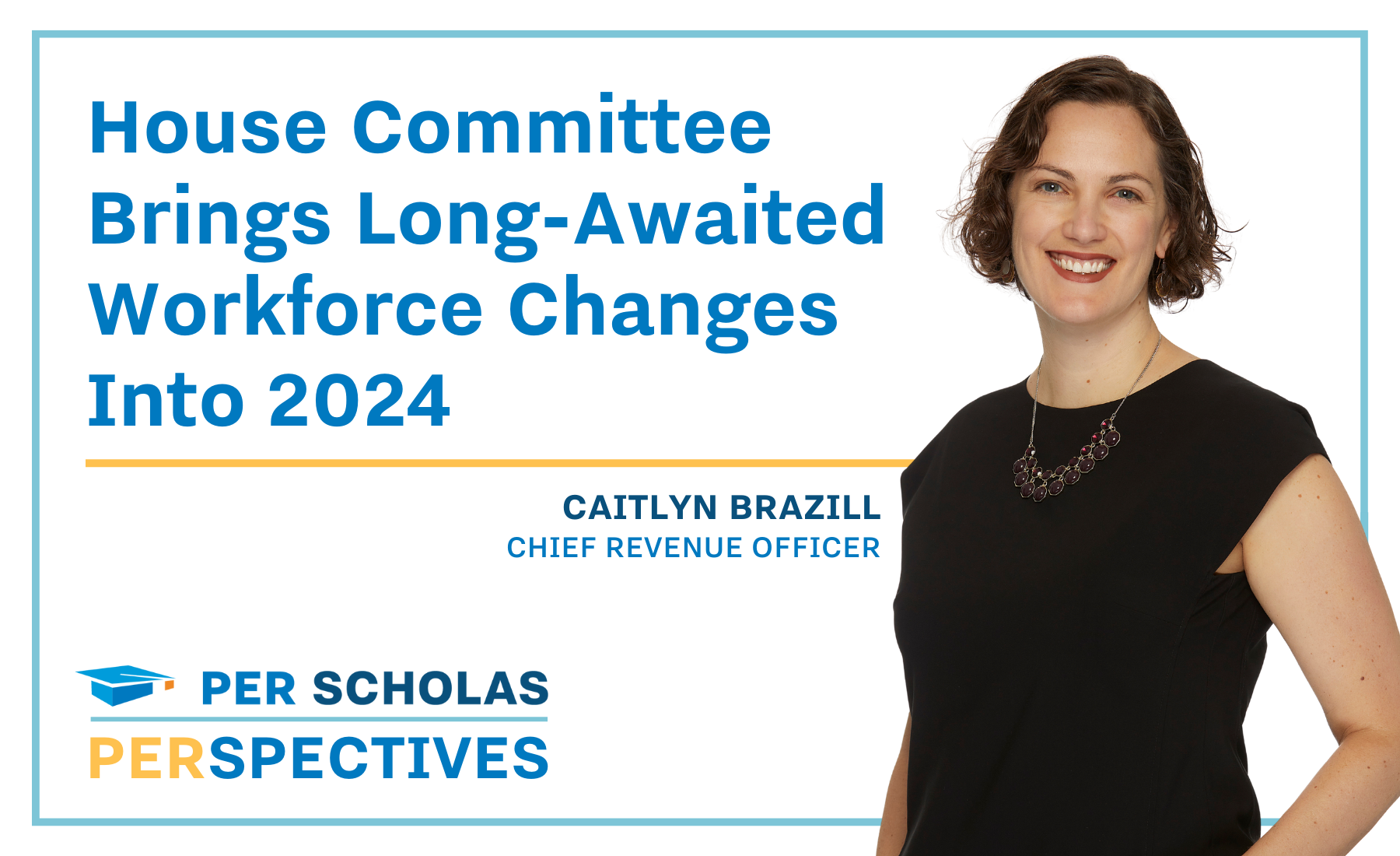
House Committee Brings Long-Awaited Workforce Changes Into 2024
ICYMI: Just before the new year, some remarkable action happened in Congress. Two bipartisan bills succeeded past the House Committee on Education & the Workforce, both aimed at increasing opportunities for Americans to get the skills employers need for our economies to thrive. We are excited about the movement of these two bills because it is a step in the right direction for America’s workforce—but there is still more work to be done.
The House Education & Workforce Committee passed A Stronger Workforce for America Act (H.R. 6655), which amends and reauthorizes the Workforce Innovation and Opportunity Act (WIOA), the nation’s cornerstone legislation that drives billions of federal funds into our national workforce development system. We’re thrilled to see this progress and offer our full support to Congress in ensuring that America’s workforce system sees a long-overdue modernization.
Per Scholas provides tuition-free, full-time training that opens a door for Americans who are committed to launching a career in technology to gain the skills and networks they need to succeed. For 28 years, Per Scholas has consistently helped adults increase their incomes 3x, and returns $8 in economic benefits for every $1 spent on training.
While our learners contribute their time, energy, and their tremendous skills, our donors and employers cover the costs associated with training because we believe that economic mobility shouldn’t be packaged with financial debt.
With our proven model, Per Scholas has been able to increase our scale of 2000 adult learners per year in 2020 by 150%—that means we’ll reach more than 5,000 immersive learners next year, plus 2,000 alumni committing to upskilling. But to keep this momentum in our training, we need our government to invest federal dollars in the right places.
H.R. 6655 will make it easier for the current workforce system to support cohort-based, demand-driven models like Per Scholas. The newest provisions create stronger alignment for workers, training providers, and employers. In fact, several changes in the bill are a direct result of the advocacy Per Scholas and peer organizations have been undertaking over the last few years, as highlighted in our organization’s letter of support to the Committee.
A Closer Look at H.R. 6655
Thanks to these collective efforts, the bill would:
- Prioritize WIOA spending (50%) on skills development for adult participants and create better clarity around performance measures, including program completion and employment outcomes;
- Streamline the Eligible Training Provider List (ETPL) by putting a greater emphasis in labor market outcomes, and reduce barriers for multi-state providers;
- Encourage innovative sector partnerships by allowing states to invest in Critical Industry Skills initiatives, which allocates resources (10%) for training and employment services in high-needs industries;
- Allows states to have more flexibility in using their WIOA funds, including greater opportunities for pay-for-performance contracting, which yield long-term equitable outcomes for communities;
- Enhance data linkages through the Workforce Data Quality Initiative and investments into workforce data infrastructure.
Also this past December, the House Education & Workforce Committee passed the Bipartisan Workforce Pell Act (H.R. 6585), which allows students and workers to upskill in high-demand industries by using federal Pell Grants to enroll in high-quality, short-term workforce programs. Per Scholas joined several peer organizations this year in promoting Pell expansion; in fact, the bill incorporates several recommendations that America Forward Coalition members shared in a public letter to Congressional leaders.
One of our major priorities that made it into the bill was no restriction on fully online/distance programs (with just a few exceptions), plus emphasizing strong performance measures. These provisions help show a shift that student outcomes are more important than the program delivery method, and that remote learning options create accessibility.
Per Scholas has as many instructional hours in our remote courses as our in-person and hybrid models, and it’s created access for many learners to launch their careers in tech. When Ariana Reed graduated from Per Scholas’ remote IT Support course last year, she felt that this was a big factor in helping her stay committed to completing the course. “It is a structured learning setting, even though it was online,” she said. “You get the experience of being in contact with other learners. You get the training – we did a lot of labs that gave us hands-on training. We had lots of resources under Per Scholas, even with the remote setting.” After graduating, Ariana started working as an IT Support Specialist at DaVita Kidney Care, a position that allows her to blend her interests in tech and healthcare.
H.R. 6585 links quality workforce programs to Pell funding, but it’s limited to accredited colleges and universities. Unfortunately, this excludes non-institutional providers like Per Scholas. This approach stifles growth among organizations and models that have most clearly demonstrated a positive impact on their participants’ economic mobility outcomes.
We will continue to engage with Congressional leaders to advocate for strengthening Pell and other reforms. As both of these bills progress in the House, Per Scholas is excited to join many other workforce stakeholders in building on this progress and engaging our Senators this year.
